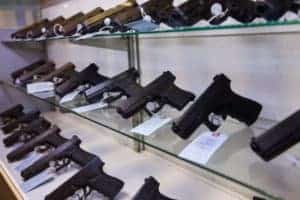Expect more “straw purchaser” prosecutions in federal gun cases
 Our nation has been rocked following yet another mass shooting. This time, seventeen students and teachers died in a high school in Parkland, Florida. In response, many have proposed passing new gun laws, such as stricter background checks and age limits, to prevent a straw purchaser from buying firearms and, perhaps, reduce the number of these tragedies in the future.
Our nation has been rocked following yet another mass shooting. This time, seventeen students and teachers died in a high school in Parkland, Florida. In response, many have proposed passing new gun laws, such as stricter background checks and age limits, to prevent a straw purchaser from buying firearms and, perhaps, reduce the number of these tragedies in the future.
But before any new laws are passed, the federal government will almost certainly ramp up its enforcement of existing laws. While politicians argue for stronger background checks, the federal government will likely start by prioritizing prosecutions for lying on a background check form.
Federal law makes it illegal for any person buying a firearm from a licensed dealer to “knowingly make any false or fictitious oral or written statement” relating to the “lawfulness” of the purchase. 18 U.S.C. § 922(a)(6). For example, this would clearly apply to someone who lies about being a felon when they purchase a gun.
Not every violation of that law is as obvious, however. When purchasing a firearm from a “Federal Firearms Dealer” (FFL), you have to fill out a Form 4473. This form requires you to disclose your social security number, name, and address. It also requires you to answer several questions, including whether you are buying the gun for yourself or another person.
A “straw purchase” is when someone buys a firearm for another person who is prohibited from buying it themselves, such as a felon, an undocumented worker, or someone convicted of domestic violence. While those people cannot purchase firearms, neither can a “straw buyer” who will just transfer the gun to the prohibited person later. Engaging in a straw purchase is a felony and punishable by up to 10 years in prison.
Until now, lying on a background form has rarely resulted in prosecution. The headlines and increased attention on gun violence, however, has the Department of Justice and the Bureau of Alcohol, Tobacco, Firearms and Explosives ready to pursue these cases more diligently.
But it’s important to remember that buying a gun for someone else is not necessarily illegal. And it’s certainly not illegal to sell or give a gun to a family member. The difference between an innocent transaction and a federal crime has to do with knowledge and intent.
Our firm has decades of experience in these cases, and we know how to push back when the feds choose the wrong case to prosecute. We have developed effective strategies in dealing with federal prosecutors and the ATF and have had great success helping our clients get their charges dismissed, negotiating pleas to less serious offenses, and winning “not guilty” verdicts in federal gun cases at trial.


Serving clients across the United States
Se Habla Español

The Church Law Firm
Centennial Tower
101 Marietta Street NW
Suite 3300
Atlanta, Georgia 30303
(404) 223-3310
© 2024 by The Church Law Firm LLC. All rights reserved.
Disclaimer | Sitemap









